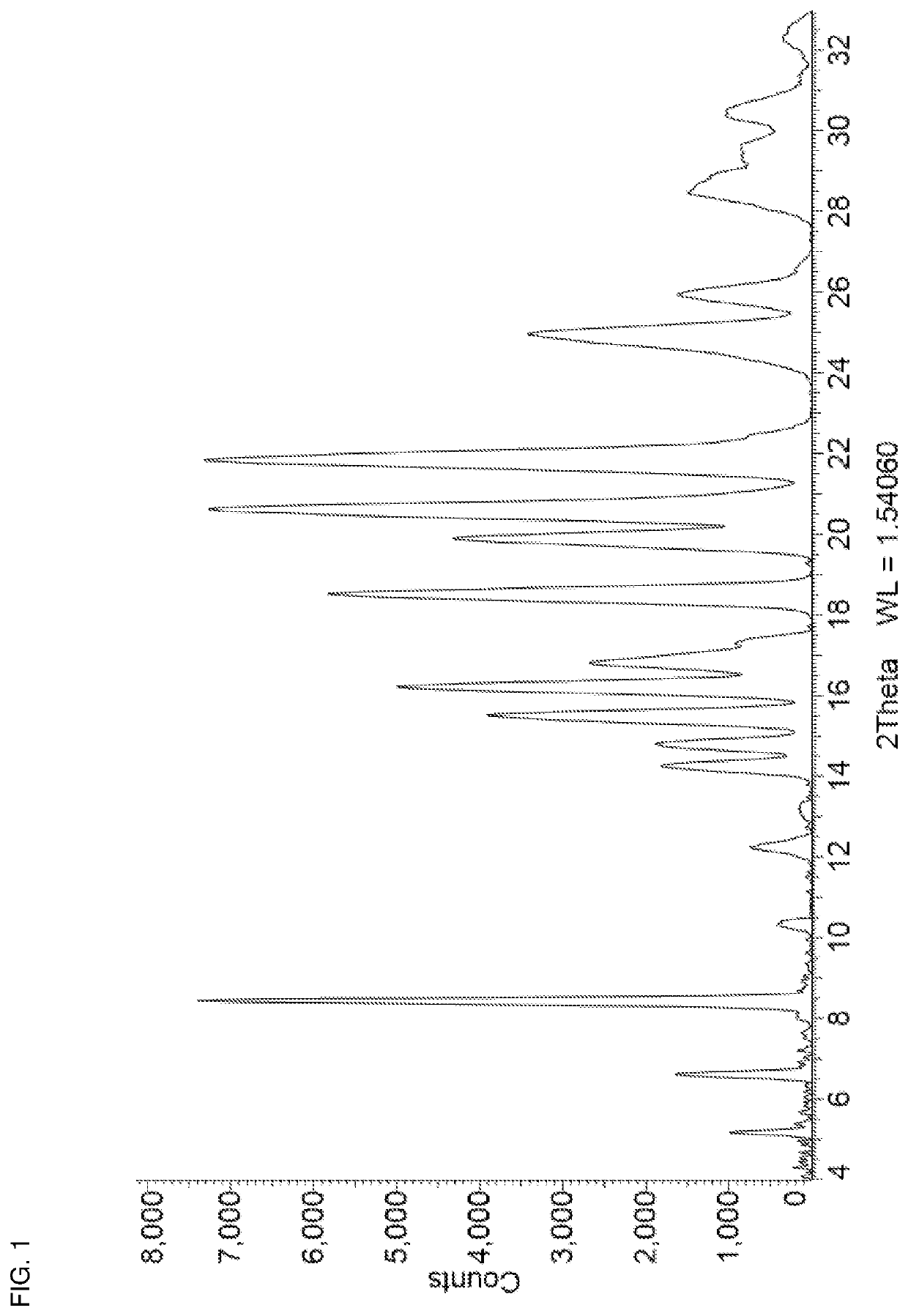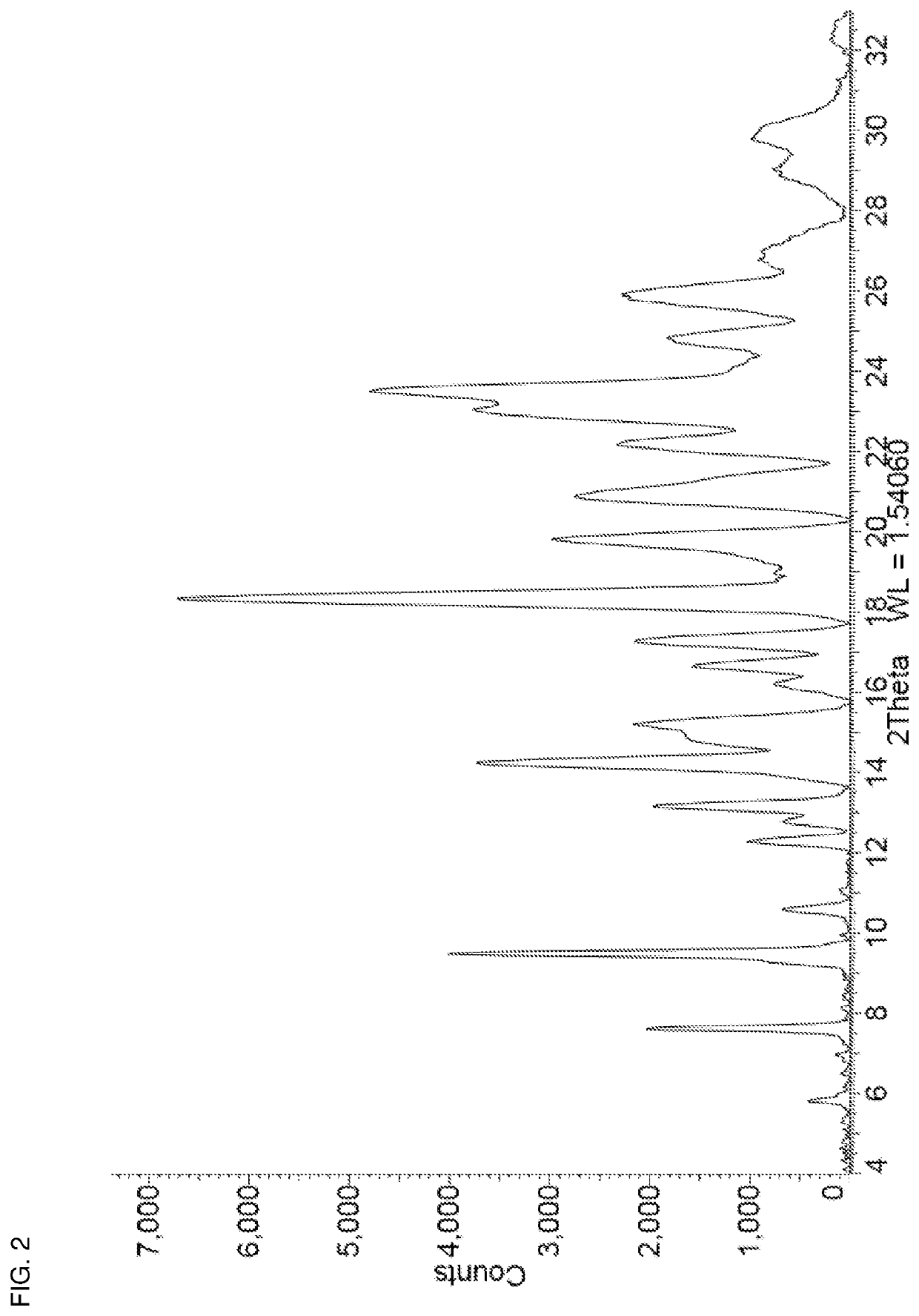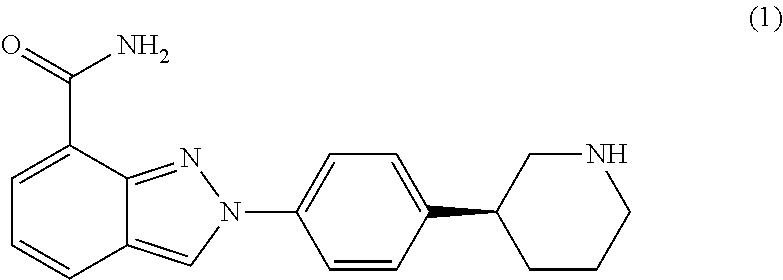Crystalline Forms of Niraparib Tosylate
- Summary
- Abstract
- Description
- Claims
- Application Information
AI Technical Summary
Benefits of technology
Problems solved by technology
Method used
Image
Examples
example 1
on of Niraparib Tosylate Form APO-I
[0067]Niraparib tosylate (1.00 g) and urea (0.12 g) were added together in a 15 mL stainless steel milling jar. The jar was fitted with a single 12 mm stainless steel ball and was tightly sealed. The solid mixture was milled neat (i.e. no additional solvent added) at room temperature for 10 minutes at 25 Hz using a Retsch Mixer Mill MM 301. Acetonitrile (200 μL) was then added and milling was continued for another 30 minutes at 25 Hz after which the jar was opened and left open for 10 minutes. This cycle of milling in the presence of acetonitrile was repeated twice more, after which the milling jar was opened and the contents removed. The resulting powder was then placed in a vial and dried in vacuo at 30° C. for 2 hours to afford niraparib tosylate Form APO-I as a white solid. 1H NMR analysis of the solid (DMSO-d6) identified a molar ratio of niraparib tosylate:urea of approximately 1:1. The PXRD diffractogram of a sample prepared by this method i...
example 2
on of Niraparib Tosylate Form APO-II
[0069]Niraparib tosylate (0.50 g) and oxalic acid (0.091 g) were added together in a 15 mL stainless steel milling jar. The jar was fitted with a single 12 mm stainless steel ball and was tightly sealed. The solid mixture was milled neat (i.e. no additional solvent added) at room temperature for 5 minutes at 25 Hz using a Retsch Mixer Mill MM 301. Methanol (100 μL) was then added and milling was continued for another 30 minutes at 25 Hz after which the jar was opened and left open for 10 minutes. Additional methanol (50 μL) was added and milling continued for another 30 minutes at 25 Hz, after which the milling jar was opened and the contents removed. The resulting powder was then placed in a vial and dried in vacuo at 30° C. for 12 hours to afford niraparib tosylate Form APO-II as a white solid. The PXRD diffractogram of a sample prepared by this method is shown in FIG. 2. TGA analysis (25-360° C.@10° C. / min; 85 mL / min N2 flow) of the sample show...
example 3
ve Intrinsic Dissolution Rate Testing
[0070]Intrinsic dissolution rate (IDR) measurements were performed using a Wood apparatus. Samples were prepared by compressing the sample at 1.5 metric tons for 1 minute. A dissolution medium consisting of 900 mL 0.01 N HCl buffer, and rotation speed of 50 rpm was used for each experiment. Results are provided in Table 3.
TABLE 3Comparative intrinsic dissolution rates for a crystalline form of the invention with the crystalline Form I ofniraparib tosylate described in WO 2018 / 183354 A1Intrinsic Dissolution Rate Form(mg min−1 cm−2)Niraparib tosylate0.1451crystalline Form I (400 mg)(Prior Art)Niraparib tosylate Form0.3110APO-II (300 mg)
PUM
| Property | Measurement | Unit |
|---|---|---|
| Fraction | aaaaa | aaaaa |
| Fraction | aaaaa | aaaaa |
| Fraction | aaaaa | aaaaa |
Abstract
Description
Claims
Application Information
 Login to View More
Login to View More - R&D
- Intellectual Property
- Life Sciences
- Materials
- Tech Scout
- Unparalleled Data Quality
- Higher Quality Content
- 60% Fewer Hallucinations
Browse by: Latest US Patents, China's latest patents, Technical Efficacy Thesaurus, Application Domain, Technology Topic, Popular Technical Reports.
© 2025 PatSnap. All rights reserved.Legal|Privacy policy|Modern Slavery Act Transparency Statement|Sitemap|About US| Contact US: help@patsnap.com



